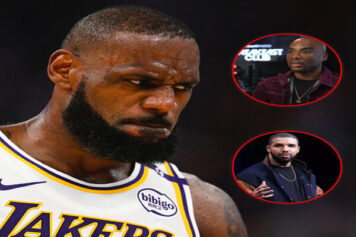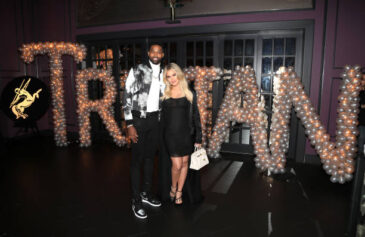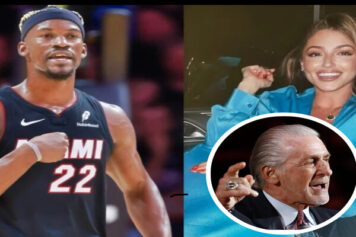Moments after the Los Angeles Lakers fired Mike Brown, I received an email from a man that is among the handful of men I respect most in this world. He is a sane man. Yet, he sent me a link to Jerry Buss' contributions to political campaigns — which skewed overwhelmingly Republican — and followed it with this missive/conspiratorial idea:
This is a response. A wake up call. After Obama, everything has changed. There will be repercussions. And this is one. If they [Lakers] wanted to make a change, do it before the season. Or give him to the All-Star break. That is not what they wanted. They wanted to make an example and send a signal to [Buss'] Republican cronies that no longer can those who ask for handouts be tolerated.
To me, that sounds like crazy talk, but the sentiment is not at all unprovoked or even, on some levels, unwarranted. America has not had the same "national" conversation on race, following Barack Obama's election to his second term; but it is definitely a topic of conversation again amongst protective and proud black households and also seething bigots. Just scan the Internet memes and tweets for myriad examples of both. When black people witness the moronic vitriol thrown Obama's way, it can, at worst, make them blinded by race goggles or, at least, throw up some racially sensitive antennae.
The "black coach thing" has always been a lightning rod for black folks. There has long been a prevailing thought among many groups that, so often, this country seems to be most comfortable with white men running the show — in sports, in business, in government and so many other sectors of leadership. Scan the racial and gender make up of CEOs, Congress and coaches and the numbers bear that out in pretty stark terms.
And, although the NBA routinely scores 'A's from Richard Lapchick on his yearly Diversity Report Card, black people often wonder if black coaches are on a short leash. Why didn't the Nets give Byron Scott more time to right that ship? What about Avery Johnson's dismissal in Dallas? Why isn't Brian Shaw a head coach? How come Mario Elie never got a head-coaching gig? Or … and this is the biggy … Why does it seem like black coaches always get the job when a team is rebuilding or on the cusp? Why do white coaches tend to fill contender-vacancies?
There are valid answers and exceptions for many of these questions. It's a murky conversation. What shouldn't be dismissed, however, is that they are asked because history and precedent across American life demands that kind of scrutiny.
Yet, sometimes that ain't what it's all about. Mike Brown wasn't fired because of some preconceived notion about "the black man's ability to lead” and he wasn't fired as a sinister reaction and veiled answer to the Obama presidency. He was fired because ish wasn't working, ish probably wasn't going to work; and Kobe Bryant's career, the Lakers' $100 million-plus payroll and Dwight Howard's looming free agency has the organization ticking louder than a Public Enemy bomb. Brown was never the right fit.
************
Mike Brown has always battled against public perception of contextual incompetence. Not a lack of competence in his field in general, but for his job at hand. Brown is a fiercely smart man and knows his basketball. He is fit to be an NBA coach. But, thus far in his head-coaching career, his "job at hand" was always more than simply coaching an NBA team. In Cleveland, he was tasked with helming a Cavs squad led by LeBron James – the best player and most precious athletic commodity on earth – to an NBA championship. He was tasked with making sure the league's chief talent wouldn't waste his prime years not winning rings and Brown shouldered the added burden of knowing that, if he didn't help LeBron to the summit, Bronski would bolt town for winning pastures. As the years and playoff disappointments mounted, the growing consensus was that Brown wasn't the man for the job. The Cavs, it was held, needed a more imaginative offensive mind and a man with a heftier aura.
There was always something about Brown's comportment that lent itself towards this perception of being "not the right man." The glasses, the nasally voice, the standing in the huddle while his assistants diagrammed plays, the perceived subordinate relationship to LeBron – he was too much "A Dude" and not enough "That Dude." No matter how many 60-win seasons Brown coached, when the playoffs came and it was time for him to outwit his opponent on the other end of the sideline and, especially, motivate a group of men that were mentally and physically fatigued from a grueling season, Brown ultimately fell short.
Every season, a few teams have the personnel, personalities and expectations that require a certain kind/level of coach to succeed at the "job at hand." And, based on Brown's performance with the Cavs, that's why it was so curious that Mitch Kupchak chose Brown to replaced the departed Phil Jackson as the Lakers head coach two summers ago. The Lakers were coming off an embarrassing playoff exit to Dallas that saw the squad unravel with some conspicuously b****made plays. If Master Phil couldn't steer the ship, surely the criteria of his replacement was almost unreachably high, right? Apparently not. If it weren't for Kupchak's string of deft management moves and steady stewardship, the lynch mobs would've called for his gig.
The questions hovered all season. Did Kobe respect Brown? Better yet, did the sometimes petulant Andrew Bynum respect Brown enough? Could Brown motivate Pau Gasol? The answers were maybe, didn't seem so (Bynum's unapologetic trey-chucking), and no. The Thunder pulled up L.A.'s skirt while Mike Brown stood on the sidelines with expressions that toggled between bewilderment and semi-amused embarrassment. Judging from last season, you just knew that, unless Brown proved a bunch of cats wrong, this current season would end worse.
Think about it: you have a team with disparate offensive parts playing for a coach that wasn't an offensive maestro; you had a team full of raging and sensitive egos playing for a man neither known as a steel hand or players' coach; and you had a team, under unparalled scrutiny, that owned the league's highest expectations. You can argue that implementing a new offense for a brand new roster is something that takes patience. You can claim that Nash's injury and Howard's recovery further delayed things. The fact, though, that the Lakers didn't have the confidence to be patient. Unfair? Maybe. Harsh? No question. Prescient? I think so. Brown was not the man for the job at hand.
My Pops has long been a Brown supporter – not fan, but supporter. His general feeling was, "Man, I'm sick of folks claiming that bruthas can't coach. The man had them jack-leg Cavs squads winning 60 games." And he's right – the man can coach…he just might not be a "championship coach." But, rest assured that Mike Brown, if he wants one, will get another head coaching opportunity. It won't be with a team like the Lakers, though. That's not his speed. Please recognize, though, that his firing says little to nothing socially about black coaches, the NBA and its owners and everything about Mike Brown.



